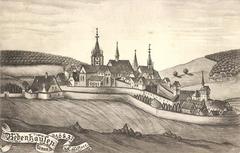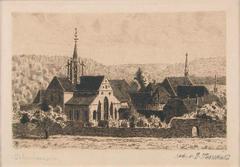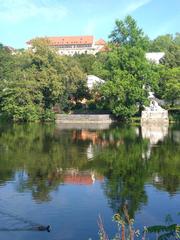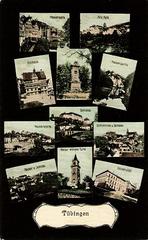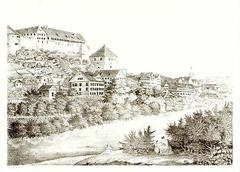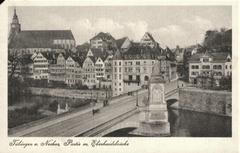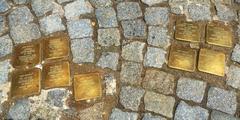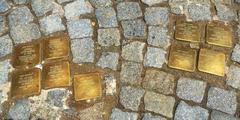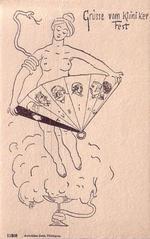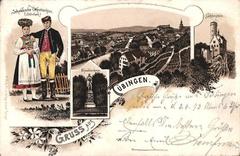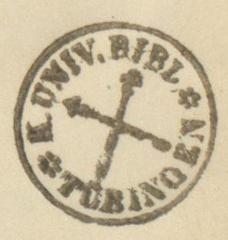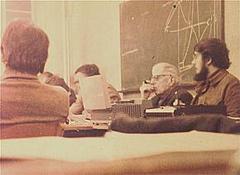Utta Keppler Memorial: Visiting Hours, Tickets, and Historical Site Guide in Tübingen, Germany
Date: 14/06/2025
Introduction
The Utta Keppler Memorial is a profound tribute situated in the Wanne district of Tübingen, Germany, honoring the influential 20th-century German writer and journalist Utta Keppler (1905–2004). Celebrated for her pioneering biographical novels, particularly “Die Falterfrau,” Keppler illuminated the resilience and achievements of women throughout history. This memorial not only acknowledges her literary legacy but also stands as a significant feminist landmark, underscoring the importance of women’s contributions in a traditionally male-dominated society.
Designed by sculptor Uli Gsell, the memorial features a marble column and a head relief of Keppler, inscribed with the words “Mit der Seele den Sinn suchen” (“With the soul, seek meaning”). Engraved around the base are names of historical women, reflecting Keppler’s dedication to chronicling female histories often neglected in mainstream narratives. The site is publicly accessible at all hours, free of charge, and is seamlessly integrated into Tübingen’s cultural landscape, connecting visitors to nearby attractions such as the Kunsthalle Tübingen and the Botanical Garden.
This guide provides comprehensive details on visiting the Utta Keppler Memorial, including practical information, historical context, cultural significance, and tips for making the most of your visit. Whether you are a literary enthusiast, cultural scholar, or a tourist exploring Tübingen, this resource will equip you with everything you need to appreciate the memorial’s enduring impact.
For further information and planning, consult the Tübingen Tourist Information Center and Komoot.
Contents
- Overview of the Utta Keppler Memorial
- Visiting Information
- Location & Accessibility
- Visiting Hours & Tickets
- How to Reach the Memorial
- Best Times to Visit
- Guided Tours & Programs
- Historical and Literary Context
- Utta Keppler’s Life & Legacy
- History and Design of the Memorial
- Artistic, Feminist, and Social Perspectives
- Nearby Attractions & Integration into Local Heritage
- Visitor Tips & FAQ
- Visuals and Media Suggestions
- Emergency Contacts & Travel Resources
- Summary and Final Tips
- Sources
Overview of the Utta Keppler Memorial
The Utta Keppler Memorial is a thoughtfully designed monument in Tübingen’s Wanne district, directly opposite the Luise-Wetzel-Stift, where Keppler spent her final years. It honors Keppler’s contributions as a writer who spotlighted women’s stories and serves as a focal point for feminist discourse, cultural memory, and artistic reflection.
Visiting Information
Location & Accessibility
- Address: Opposite Luise-Wetzel-Stift, Wanne district, 72076 Tübingen, Germany
- GPS Coordinates: 48.5350° N, 9.0470° E
- The memorial is situated within a peaceful residential area, near university facilities and green spaces.
- Accessibility: Fully wheelchair accessible with flat, paved paths; suitable for visitors with limited mobility.
Visiting Hours & Tickets
- Opening Hours: 24 hours a day, year-round.
- Admission: Free of charge; no ticket required.
How to Reach the Memorial
- By Public Transport: Take bus lines 4 or 5 from Tübingen Hauptbahnhof to the Wanne district; the memorial is a short walk from the “Luise-Wetzel-Stift” stop (Tübingen Public Transport).
- By Car: Metered street parking is available nearby.
- Walking/Cycling: The memorial is on scenic walking and cycling routes linking to the Kunsthalle Tübingen and the Botanical Garden (Komoot).
Best Times to Visit
Late spring through early autumn (May–September) offers pleasant weather and lush surroundings. Early mornings and late afternoons are ideal for quieter, more contemplative visits.
Guided Tours & Educational Programs
- Local guided tours of Tübingen’s literary and historical landmarks often include the memorial.
- Educational programs for schools and community groups are available; check with Tübingen Info for schedules.
Historical and Literary Context
Utta Keppler: Life & Legacy
Utta Keppler (née Ris) was a German writer and journalist whose work foregrounded the lives of women striving for self-realization in patriarchal societies. After studying at the Stuttgart Art Academy and raising four sons, she authored meticulously researched biographical novels, most notably “Die Falterfrau” (1967), about the naturalist Maria Sibylla Merian. Keppler’s dedication to highlighting often-overlooked female figures has cemented her place in German literary history (Wikipedia, Tuepedia).
History and Design of the Memorial
The memorial was established in 2015 to honor Keppler’s literary achievements and her commitment to documenting women’s histories. Supported by the local government and district council, the project was realized by sculptor Uli Gsell. The marble column’s stability symbolizes Keppler’s enduring impact, while its inscription and engraved names of historical women highlight her literary and feminist philosophy (RTF1, Commons Wikimedia).
Artistic, Feminist, and Social Perspectives
Artistic Significance
The classical column form, paired with the expressive head relief and motto, blends strength with introspection. The memorial bridges literary and visual arts, encouraging creative engagement with public memory (Komoot).
Feminist Significance
As a rare public monument to a woman, the memorial disrupts the male-centric tradition of commemoration. The engraved names on the base emphasize the collective nature of women’s experiences and the importance of representation (Cambridge Companion to Feminist Literary Theory).
Community and Educational Role
The memorial is a site for reflection, educational programs, and community dialogue, promoting gender equity and cultural memory. It is used for school projects, guided tours, and cultural events (Tübingen Info).
Nearby Attractions & Integration into Local Heritage
- Kunsthalle Tübingen: Contemporary art exhibitions, 1 km away (Tourist Places Guide).
- Tübingen Botanical Garden: A tranquil space for plant lovers.
- Hohentübingen Castle: Medieval fortress and museum, 2.5 km from the memorial.
- Tübingen Old Town: Picturesque streets, Marktplatz, and riverside walks (The Spicy Journey).
- Accommodation: Options include Hotel am Kupferhammer and Hotel am Schloss (My Germany Vacation).
Visitor Tips & FAQ
Practical Tips
- Weather: Tübingen’s mild climate makes outdoor visits pleasant; bring rain gear as needed.
- Facilities: Benches and public restrooms nearby; cafés in walking distance.
- Etiquette: Maintain respectful behavior; the site is a place of reflection.
Frequently Asked Questions
Q: What are the opening hours of the Utta Keppler Memorial?
A: The memorial is in a public space and accessible 24/7, year-round.
Q: Is there an admission fee or ticket required?
A: No, the site is free to access.
Q: Is the memorial wheelchair accessible?
A: Yes, it is fully accessible with paved paths.
Q: Are guided tours available?
A: Guided tours are occasionally offered by local organizations; check Tübingen Info for schedules.
Q: How do I get to the memorial from the city center?
A: Take bus lines 4 or 5 to the Wanne district, or walk/cycle via well-marked paths.
Visuals and Media Suggestions
- Image 1: Utta Keppler Memorial marble column and head relief — Alt text: “Utta Keppler Memorial marble column with head relief in Tübingen, Germany”
- Image 2: Close-up of the inscription “Mit der Seele den Sinn suchen” — Alt text: “Inscription on Utta Keppler Memorial in Tübingen”
- Virtual tours and interactive maps are available on the Tübingen city website.
Emergency Contacts & Visitor Resources
- Emergency (Police/Fire/Ambulance): 112
- Tourist Information Office: +49 7071 91360 | Tübingen Tourist Office
- Official Tübingen City Website: https://www.tuebingen.de/rundgaenge
Summary and Final Tips
The Utta Keppler Memorial is more than a commemorative monument—it’s a living site of literary, feminist, and cultural engagement. It stands as a beacon for gender equity in public memory, creative reflection, and community learning. Its accessible location, integration with Tübingen’s vibrant cultural scene, and connection to nearby attractions make it an essential stop for anyone interested in history, literature, or social progress.
For the richest experience, combine your visit with a stroll through Tübingen’s Old Town, the Kunsthalle, and the Botanical Garden. Leverage resources like the Tübingen Tourist Information, Komoot, and the Audiala app for audio guides and up-to-date event information.
Embrace the opportunity to reflect on the contributions of women to culture and society by visiting this inspiring site in one of Germany’s most cherished university towns.
Sources
Wikipedia, Tuepedia, Komoot, RTF1, Tübingen.de, Mapcarta, Commons Wikimedia, Cambridge Companion to Feminist Literary Theory, The Spicy Journey, Eupedia, Literariness, Tourist Places Guide, My Germany Vacation, Justin Plus Lauren
